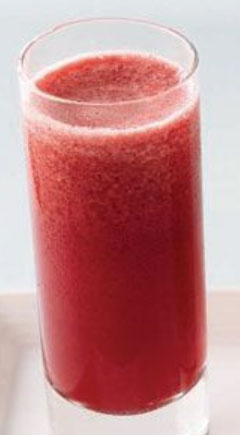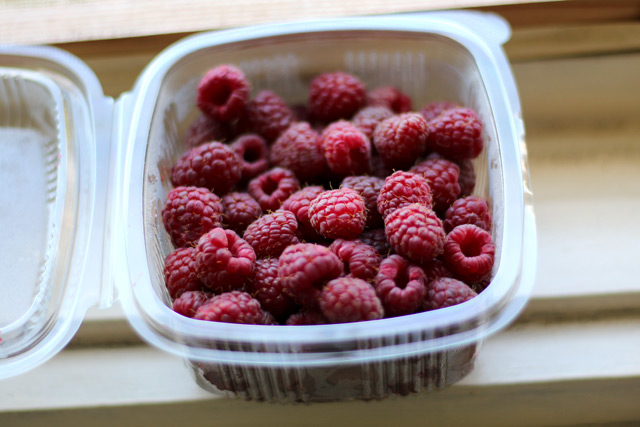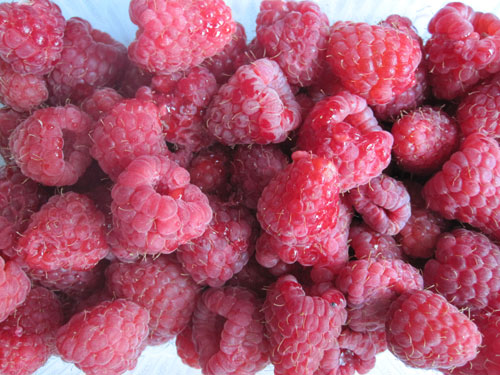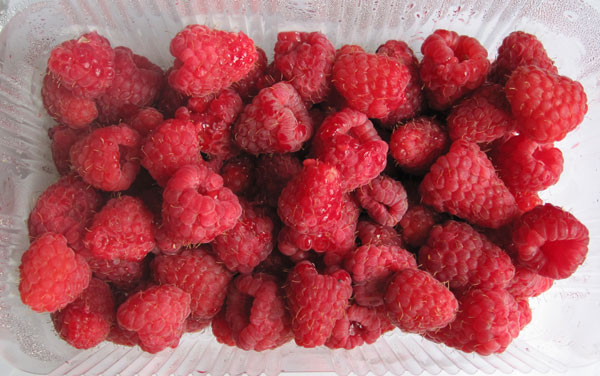Benefits of Raspberries and Their Use in Juices and Smoothies

I love juices! As I decided to be healthier, I try to experiment with my juices throughout the day… and whenever I feel like recharging my batteries and boosting my immune system I choose Raspberry juice. If you are looking for a healthy and delicious juice, this is a great choice.
Not only does Raspberry juice taste good, but it is a great source of nutrients for the body. It contains a couple of important nutrients, as you will see in just a second.
My entire family loves it, because we all know that a balanced and healthy diet should include a lot of fresh fruits, both juiced and whole.
Fruit juices, in general, are very healthy because they help our body detoxify and reduce the risks of cancer and heart problems. Raspberry juice offers a lot of benefits due to its mineral and vitamin contents.
Table of Contents
Health Benefits
Raspberry juice is a great source of Vitamin C, Vitamin K and Magnesium, but it lacks the Dietary Fiber present in the whole berries.
Raspberries are very low in sodium, cholesterol, and saturated fat. A cup of fresh raspberries (123 g) amounts to:
- 65 calories,
- 32 milligrams of ascorbic acid (equivalent to 50 percent of Daily Values(DV)),
- 41% of DV of manganese,
- and provides roughly one third of daily fiber.
(source Nutrition Data)
On top of that, you will get some folate, niacin, phosphorus, zinc, magnesium, potassium and calcium.
Vitamin C
One of the most important nutrient contained in raspberries is vitamin C. The alternative name of vitamin C is ascorbic acid. There is hardly anyone not familiar with the health related properties of vitamin C, such as easier healing of burns and wounds, maintaining bodily integrity on cellular level, aiding the cholesterol metabolism and hormone production, and strengthening the immune system.
Glycemic index
Raspberries are low glycemic index foods, with a glycemic index around 25. As such, they are suitable for people with diabetes type 2. Even more so, if we consider their glycemic load it will be somewhere around 3, which puts them among the foods with very low glycemic load. Still, I recommend using them in moderation. Due to the fructose content (see below), don’t go overboard. Too much fruit is not so good if you are trying to bring your insulin levels under control.
Manganese
 If you want to increase the intake of manganese, which is one of the important essential micro-elements, raspberry juice can be an ideal source.
If you want to increase the intake of manganese, which is one of the important essential micro-elements, raspberry juice can be an ideal source.
Why is manganese important?
Manganese plays an crucial role in a number of physiological processes in the human body:
- It protects the body from free radicals,
- helps us get energy from the foods we eat,
- and promotes bone development.
We need only small amounts of this mineral every day… yet it is essential to life. According to the University of Maryland Medical Center, one out of three Americans does not take the recommended daily dosage of this mineral.
Vitamin K
Another important nutrient that raspberries and raspberry juice provide is vitamin K.
- Vitamin K promotes the health of the bones, and
- helps regulate blood clotting.
Drinking a cup of raspberry juice every day can help increase the levels of vitamin K in our body. Other sources of Vitamin K are leafy greens meats, eggs, and cheese.
Ellagic Acid
Ellagic acid is a natural antioxidant found in a number of fruits and vegetables. It has strong antioxidant and antiproliferative properties. The antiproliferative properties simply mean preventing or retarding the spread of cells, especially malignant cells. Raspberries, along with the other berries are amongst the most important natural sources of this acid. The ellagic acid from the berries is readily absorbed in the human organism.
Ketone Supplements
The ketone found in Raspberries is an organic aromatic compound. It is responsible for their characteristic smell. This ketone is used as an additive in foods, or as an integral part of perfumes and other cosmetic products. Today, this substance can be produced in laboratory, and most of the supplements available on the markets are man-made. One of the latest discoveries is using raspberry ketones as a supplement for weight loss. The claim has been that they help break down the fat within the human body more easily, but the results are questionable.

Raspberries, fresh, in a plastic container
How much is enough
In order to obtain one cup of raspberry juice you would need three to four times as many fresh berries.
You should consume freshly squeezed raspberry juice in moderation… about one cup daily. For some people even that amount might be too much.
One cup of homemade raspberry juice contains somewhere between 9 and 12 grams of fructose. If you are obese, have diabetes type 2, or metabolic syndrome, your priority should be reducing the total amount of fructose in your diet to no more than 15 grams per day, even if the source of fructose is totally natural, like in this case.
The other reason is simple. While this juice is great and offers a lot of benefits, it lacks the dietary fiber contained in whole raspberries. It might be more beneficial to eat your raspberries in their integral form.
Other than preparing juice, I love to blend raspberries in my vegetable smoothies to make them healthier. If you haven’t used them before, there is no reason why you shouldn’t start using them as of today.
Other Considerations
Raspberry juice is very delicious, either on its own, or as a combination with other juices. It combines well with a lot of fruit and vegetable juices. And, therefore, you can experiment with it freely.
For example, you can mix it with other berries, like strawberries, cranberry juice, or blueberry juice. It also combines well with orange juice, lettuce juice, carrot, apples, and grapes. I love adding some mint, lemon juice, a tablespoon of extra virgin olive oil or even vinegar to my juice combinations and smoothies.
In conclusion, there is no reason why you shouldn’t include raspberry juice in your daily diet plan. It contains hardly any calories, it is low in fat and has many nutrients. It is packed with antioxidants that help you slow aging, and it helps reduce the risk of heart disease and cancer.
As always choose organic raspberries if you can. They have a tendency to rot or mold just one day after you’ve bought them. Putting them in a fridge doesn’t seem to matter much and there is hardly anything you can do to prevent it. Therefore, use them fresh, and prepare and drink your juice right away.
Cheers!



I love raspberries to death but unfortunately I can’t always find fresh ones and I buy them frozen. Just how much am I missing out on by doing this? I have them as a quick snack, mix them with yogurt and coconut flakes, they’re my go-to fruit whenever I’m at home. As for juicing, it’s way better than the insanely popular orange juice, at least for me. I also pop some raspberries in my green smoothies, along with some avocado and baby spinach or kale.
Don’t worry about the frozen raspberries. There’s enough evidence that frozen raspberries are just as good as the fresh ones. They are as healthy, delicious, and nutritious. And I agree with you: raspberry juice is much healthier than orange juice, and even more so if used in green smoothies. All in all, one of the best fruit variety out there. Thank for taking the time to comment and cheers!
Raspberries are great. But we have to consider the overall changes in lifestyle and food habits, that is if we want to decrease the modern diseases.
Raspberry ketones are interesting compounds. Couple of year ago, I tried some of htem. Otherwise you would have to eat too many raspberries to get enough ketones, so supplementation is a must. Dr oz has a raspberry ketones supplement, which is marketed due to its benefits like bloodd sugar control, pressure control, anti-oxidant and anti-cancerous action. It is also believed to prevent wrinkles in the skin, strengthen the hair, provide omega 3 fatty acids which is necessary to prevent heart diseases. Maybe also affects the cholesterol level, controls diabetes, and so on, who knows. I have to tell you, nothing will happen if you dont change your life style and eating habits. Those are minor changes you make with supplements, unless you change your life style. Thanks.
In fact, the anti-obese action of raspberry ketone seems to have some scientific foundation. Check this study:
http://www.sciencedirect.com/science/article/pii/S0024320505001281
However, in the study, the rodents have been given up to 2% of caloric intake from raspberry ketones. That’s way too much to be able to replicate in humans. And expensive too.
I have to add, your body is capable of producing ketones on its own. It just has to enter the fat-burning mode, often called ketosis. To be able to do so, the basic requirement is consuming no more than 50 grams of carbohydrates a day. Your body switches to using ketones as an alternative fuel. The ketones are produced in the liver from the food you eat.